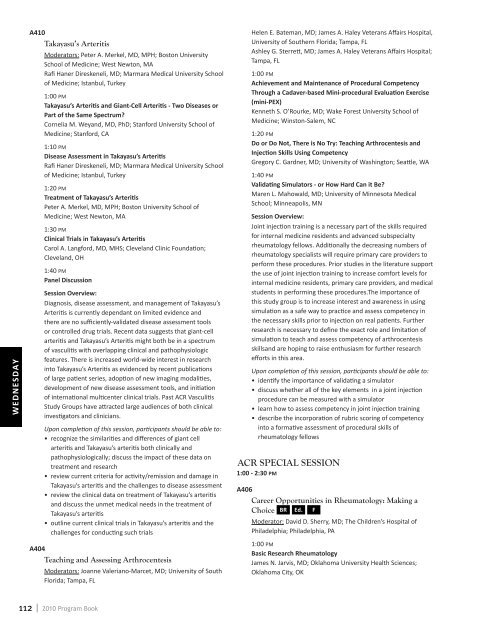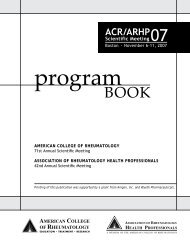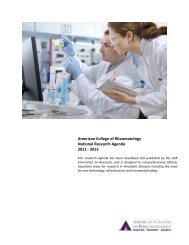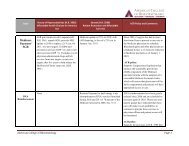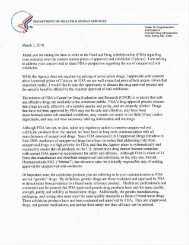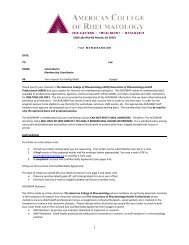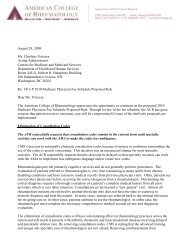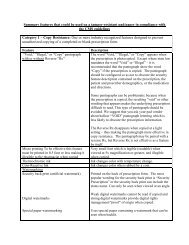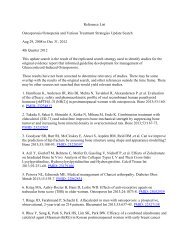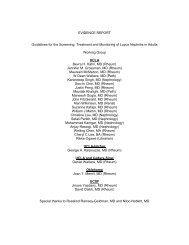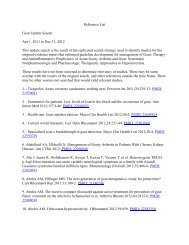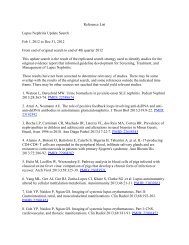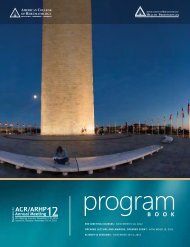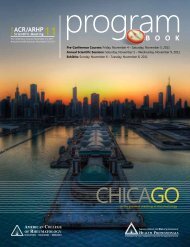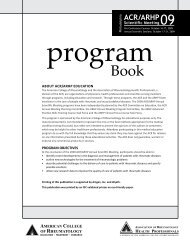B O O K - American College of Rheumatology
B O O K - American College of Rheumatology
B O O K - American College of Rheumatology
You also want an ePaper? Increase the reach of your titles
YUMPU automatically turns print PDFs into web optimized ePapers that Google loves.
wednesday<br />
A410<br />
Takayasu’s Arteritis<br />
Moderators: Peter A. Merkel, MD, MPH; Boston University<br />
School <strong>of</strong> Medicine; West Newton, MA<br />
Rafi Haner Direskeneli, MD; Marmara Medical University School<br />
<strong>of</strong> Medicine; Istanbul, Turkey<br />
1:00 PM<br />
Takayasu’s Arteritis and Giant-Cell Arteritis - Two Diseases or<br />
Part <strong>of</strong> the Same Spectrum?<br />
Cornelia M. Weyand, MD, PhD; Stanford University School <strong>of</strong><br />
Medicine; Stanford, CA<br />
1:10 PM<br />
Disease Assessment in Takayasu’s Arteritis<br />
Rafi Haner Direskeneli, MD; Marmara Medical University School<br />
<strong>of</strong> Medicine; Istanbul, Turkey<br />
1:20 PM<br />
Treatment <strong>of</strong> Takayasu’s Arteritis<br />
Peter A. Merkel, MD, MPH; Boston University School <strong>of</strong><br />
Medicine; West Newton, MA<br />
1:30 PM<br />
Clinical Trials in Takayasu’s Arteritis<br />
Carol A. Langford, MD, MHS; Cleveland Clinic Foundation;<br />
Cleveland, OH<br />
1:40 PM<br />
Panel Discussion<br />
Session Overview:<br />
Diagnosis, disease assessment, and management <strong>of</strong> Takayasu’s<br />
Arteritis is currently dependant on limited evidence and<br />
there are no sufficiently-validated disease assessment tools<br />
or controlled drug trials. Recent data suggests that giant-cell<br />
arteritis and Takayasu’s Arteritis might both be in a spectrum<br />
<strong>of</strong> vasculitis with overlapping clinical and pathophysiologic<br />
features. There is increased world-wide interest in research<br />
into Takayasu’s Arteritis as evidenced by recent publications<br />
<strong>of</strong> large patient series, adoption <strong>of</strong> new imaging modalities,<br />
development <strong>of</strong> new disease assessment tools, and initiation<br />
<strong>of</strong> international multicenter clinical trials. Past ACR Vasculitis<br />
Study Groups have attracted large audiences <strong>of</strong> both clinical<br />
investigators and clinicians.<br />
Upon completion <strong>of</strong> this session, participants should be able to:<br />
• recognize the similarities and differences <strong>of</strong> giant cell<br />
arteritis and Takayasu’s arteritis both clinically and<br />
pathophysiologically; discuss the impact <strong>of</strong> these data on<br />
treatment and research<br />
• review current criteria for activity/remission and damage in<br />
Takayasu’s arteritis and the challenges to disease assessment<br />
• review the clinical data on treatment <strong>of</strong> Takayasu’s arteritis<br />
and discuss the unmet medical needs in the treatment <strong>of</strong><br />
Takayasu’s arteritis<br />
• outline current clinical trials in Takayasu’s arteritis and the<br />
challenges for conducting such trials<br />
A404<br />
Teaching and Assessing Arthrocentesis<br />
Moderators: Joanne Valeriano-Marcet, MD; University <strong>of</strong> South<br />
Florida; Tampa, FL<br />
Helen E. Bateman, MD; James A. Haley Veterans Affairs Hospital,<br />
University <strong>of</strong> Southern Florida; Tampa, FL<br />
Ashley G. Sterrett, MD; James A. Haley Veterans Affairs Hospital;<br />
Tampa, FL<br />
1:00 PM<br />
Achievement and Maintenance <strong>of</strong> Procedural Competency<br />
Through a Cadaver-based Mini-procedural Evaluation Exercise<br />
(mini-PEX)<br />
Kenneth S. O’Rourke, MD; Wake Forest University School <strong>of</strong><br />
Medicine; Winston-Salem, NC<br />
1:20 PM<br />
Do or Do Not, There is No Try: Teaching Arthrocentesis and<br />
Injection Skills Using Competency<br />
Gregory C. Gardner, MD; University <strong>of</strong> Washington; Seattle, WA<br />
1:40 PM<br />
Validating Simulators - or How Hard Can it Be?<br />
Maren L. Mahowald, MD; University <strong>of</strong> Minnesota Medical<br />
School; Minneapolis, MN<br />
Session Overview:<br />
Joint injection training is a necessary part <strong>of</strong> the skills required<br />
for internal medicine residents and advanced subspecialty<br />
rheumatology fellows. Additionally the decreasing numbers <strong>of</strong><br />
rheumatology specialists will require primary care providers to<br />
perform these procedures. Prior studies in the literature support<br />
the use <strong>of</strong> joint injection training to increase comfort levels for<br />
internal medicine residents, primary care providers, and medical<br />
students in performing these procedures.The importance <strong>of</strong><br />
this study group is to increase interest and awareness in using<br />
simulation as a safe way to practice and assess competency in<br />
the necessary skills prior to injection on real patients. Further<br />
research is necessary to define the exact role and limitation <strong>of</strong><br />
simulation to teach and assess competency <strong>of</strong> arthrocentesis<br />
skillsand are hoping to raise enthusiasm for further research<br />
efforts in this area.<br />
Upon completion <strong>of</strong> this session, participants should be able to:<br />
• identify the importance <strong>of</strong> validating a simulator<br />
• discuss whether all <strong>of</strong> the key elements in a joint injection<br />
procedure can be measured with a simulator<br />
• learn how to assess competency in joint injection training<br />
• describe the incorporation <strong>of</strong> rubric scoring <strong>of</strong> competency<br />
into a formative assessment <strong>of</strong> procedural skills <strong>of</strong><br />
rheumatology fellows<br />
ACR Special Session<br />
1:00 - 2:30 PM<br />
A406<br />
Career Opportunities in <strong>Rheumatology</strong>: Making a<br />
Choice BR Ed. f<br />
Moderator: David D. Sherry, MD; The Children’s Hospital <strong>of</strong><br />
Philadelphia; Philadelphia, PA<br />
1:00 PM<br />
Basic Research <strong>Rheumatology</strong><br />
James N. Jarvis, MD; Oklahoma University Health Sciences;<br />
Oklahoma City, OK<br />
112<br />
2010 Program Book


